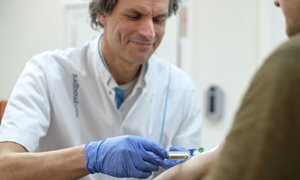
An international consortium led by Stefan Listl of the Radboud University Medical Center receives a grant of over five million euros. The project PRUDENT (Prioritization, incentives and Resource use for sUstainable DENTistry) will investigate and improve the financing of oral health care. PRUDENT thereby contributes to accessible and affordable oral care.
Oral diseases are the third most expensive diseases to treat in the European Union, behind diabetes and cardiovascular diseases. Also in the Netherlands, dental problems are one of the top three most expensive conditions. However, oral health care is still not easily accessible and affordable for everyone, because patients often face out-of-pocket payments. This can be a problem especially for people with lower incomes and vulnerable groups. Better financing of oral care is necessary to guarantee access to essential oral care for everyone. This reduces the disease and economic burden of oral diseases.
Examining oral health care across Europe
‘According to a recent report by the World Health Organization, many EU citizens do not have access to essential oral care due to financial reasons’, says Stefan Listl, professor of Quality and Safety of Oral Health Care at Radboud University Medical Center. 'Until now, little research has been done into how best to finance oral health care. There are substantial differences in the oral health care systems of European countries, but little is known about the causes and consequences of these systems.' The PRUDENT project will change that. Listl and its project partners will receive more than five million euros from the European Commission to carry out this project. 'We are going to map differences in oral health care in European countries. This gives us better insights into what works and what does not.' The researchers specifically focus on countries that have recently revised their oral health care systems, such as France. In his previous presidential term, president Macron wanted to shift oral care more towards public coverage and make it affordable for everyone. Listl: 'We will investigate whether this has been successful and what the consequences are. We will also look into the drivers and barriers of implementing such policy reforms.'
More emphasis on prevention
The project also includes an experiment into an alternative way of reimbursing oral health care for children and adolescents in the Netherlands. Currently, oral health care providers receive fee-for-service payments. This potentially leads to inefficient use of care, with an emphasis on treating the consequences of disease rather than preventing it. The experiment will examine a capitation system which adjusts for patients’ socioeconomic status. Oral care providers will receive a fixed yearly payment for each patient upfront to cover all care. Listl: ‘Many providers want to participate in the experiment. It seems there is a lot of support for a shift towards more preventive care, and such a capitation system may make it financially attractive. This could be a gamechanger to keep oral care prevention-oriented and efficient in the future.´
The PRUDENT project is a collaboration with partners from Germany, Denmark, England, Estonia, France, Hungary, Ireland, Malta, Norway and Portugal. The total project budget is 5.3 million euros, of which 1.8 million is for the research at Radboudumc. The project will run from 2023 to 2027. This program is funded by Horizon Europe of the European Union.
-
Want to know more about these subjects? Click on the buttons below for more news.







